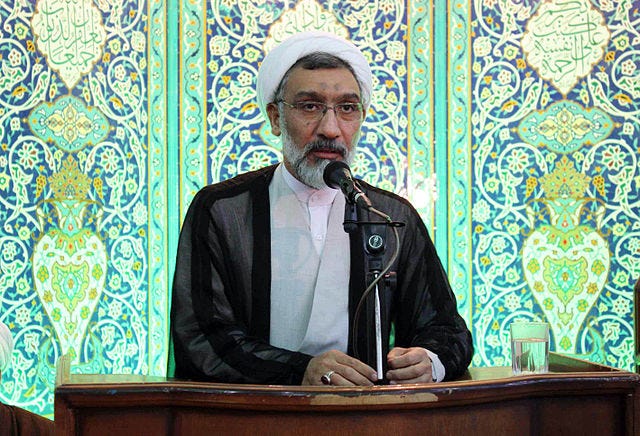Iranian presidential candidate and former foreign intelligence minister Mostafa Pour-Mohammadi (Kazem Jalili, CC4.0).
When Iranian president Ebrahim Raisi was killed in a helicopter crash last month there was much speculation about a covert assassination. That seems to have died down, but the snap election sparked by his death certainly has its intelligence aspects.
The list of six candidates approved by Iran’s Guardian Council is dominated by members of the principlist or conservative faction within the Islamic Republic’s political system, with only a single representative of the rival reformist faction.
One of the six is a former deputy at the Ministry of Intelligence and Security (MOIS) while others have close ties to the Iranian Revolutionary Guard Corps (IRGC), which has its own intelligence organisation.
The MOIS man is Mostafa Pour-Mohammadi, who was appointed as a Deputy Minister of Intelligence in 1986, acquiring the Ministry’s Foreign Intelligence portfolio from 1990 until 1999.1 He later served as interior minister under President Ahmadinejad from 2005 until 2008.2
According to the late Grand Ayatollah Montazeri, Pour-Mohammadi was a leading figure in the wave of political executions which led to Montazeri’s falling out with Iran’s supreme leader, Ayatollah Khomeini, in 1989. Montazeri identified Pour-Mohammadi as the MOIS representative on a three-man ‘death committee’ responsible for hundreds of killings at Tehran’s Evin Prison.3
Pour-Mohammadi has also been accused of involvement in the 1998 ‘chain killings’, a series of murders of dissident intellectuals, seen by some as an attempt to undermine the reformist presidency of Mohammad Khatami.4
MOIS admitted in 1999 that its personnel were involved and the Minister, Qorbanali Dorri Najafabadi, was forced to resign. Several MOIS officials later received death sentences.5
Pour-Mohammadi was among more senior figures who escaped justice, according to a Human Rights Watch report published after his nomination as interior minister.
A source with first-hand knowledge of the [Iranian Parliament] Article 90 Committee’s investigation told Human Rights Watch: “The investigators implicated Pour-Mohammadi and even an arrest warrant was about to be issued for him. But instead it was arranged that he leave his post in the Ministry of Information.” Another authoritative source, who also asked to remain anonymous, confirmed to Human Rights Watch that the investigations indeed implicated Pour-Mohammadi. Human Rights Watch wrote to Mustafa Pour-Mohammadi on October 28, 2005 asking for his response to these allegations. As of December 8, 2005, Human Rights Watch did not receive any response to its inquiry.6
According to the Tehran-based Iranian Diplomacy website, Pour-Mohammadi later give this account of his role to the Shargh newspaper:
‘My field of work was different and independent of those who were accused in the case of the Chase [sic] Killings, meaning that it was neither done under the order of my office nor were my staff involved in it.”7
He went on to note that he was head of foreign intelligence until April 1999. Human Rights Watch reports that here were numerous killings of Iranian dissidents abroad during his tenure.
In some of these cases – the assassination of Shahpur Bakhtiar, a former prime minister, and the killings of three Kurdish leaders in exile in Germany, the hand of the Iranian government is well established, while in others there are credible allegations of government involvement.8
Although he later served as Minister of Justice in the government of reformist president Rouhani, Pour-Mohammadi remains active in the principlist movement.
His inclusion as one of the few candidates approved by the Guardian Council may be intended to soften the image of other conservative candidates by comparison. Front-runners among these include Mohammad Bagher Ghalibaf, the parliamentary speaker who is a former IRGC air force commander, and former chief nuclear negotiator Saeed Jalili.
Likewise the approval of the sole reformist candidate, the ethnic Azeri member of parliament Masoud Pezeshkian, may be an attempt to raise turnout from reformist voters who have increasingly abandoned participation in recent years, threatening the Islamic Republic’s legitimacy.9
Iranian conservatives are nevertheless unlikely to loosen their grip on the process, given an emerging struggle for the succession to supreme leader Ali Khamenei, the real center of power in the country.
Mostafa Pour-Mohammadi, Iranian Diplomacy, 12 December 2012. This website is reported to be associated with the moderate reformist faction. See Behravesh, M. (2013), Iranian Diplomacy (IRD): Foreign Policy Through Conservative-Pragmatic Lenses Electronic Media Reviews. Asian Politics & Policy, 5: 483-485. https://doi.org/10.1111/aspp.12049
Biography of Mostafa Pourmohammadi, Islamic Republic News Agency, 5 August 2013.
Ministers of Murder: Iran’s New Security Cabinet, Human Rights Watch, 2005, p.6.
On the impact of the killings on the Khatami presidency, see Douglas Jehl, Killing of 3 Rebel Writers Turns Hope to Fear in Iran, New York Times, 14 December 1998.
Geneive Abdo, Iran's 'rogue agents' get death sentence, The Guardian, 29 January 2001.
Ministers of Murder: Iran’s New Security Cabinet, Human Rights Watch, 2005, p.9.
Mostafa Pour-Mohammadi, Iranian Diplomacy, 12 December 2012.
Ministers of Murder: Iran’s New Security Cabinet, Human Rights Watch, 2005, p.10.
Who’s in the running to be Iran’s next President? Al Jazeera, 11 June 2024.




